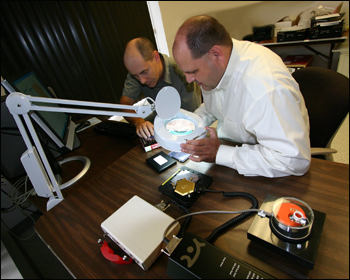Organizations preparing students for work in nanotechnology
Monday, October 1, 2007

To help address these needs, the Oklahoma Department of Career and Technology Education and Oklahoma State University-Okmulgee have launched the Oklahoma Nanotechnology Education Initiative. This initiative recently received a boost from a $598,000 Advanced Technological Education grant from the National Science Foundation.
OSU-Okmulgee President Bob Klabenes said this grant helps address two significant issues in creating the highly skilled technicians needed to meet the demand of emerging nanotechnology companies in Oklahoma.
“First, we have to develop awareness and excitement among middle and high school students about the enormous career opportunities this field will offer,” Klabenes said. “Then, we have to have sophisticated teaching facilities and labs so that students can have hands-on learning experiences with extremely complex equipment.”
Nanotechnology is the term used to describe the process of manufacturing at the molecular level. Scientists predict the technology will surpass the scope of the computer revolution, affecting everything from the batteries we use to the pants we wear to the way we treat cancer. According to the Oklahoma Nanotechnology Initiative, the state is conducting cutting-edge research in several areas of nanotechnology, including medical treatments, advanced materials and energy.
According to Sheryl Hale, manager of Innovative Programs, Research and Development at CareerTech, the ONEI is addressing these new workforce challenges by integrating microtechnology and nanotechnology concepts into career and technology education courses, and OSU-Okmulgee is developing a two-year associate degree that will advance industries’ use of microtechnology and nanotechnology.
“When implemented, ONEI will advance Oklahoma’s nanotechnology workforce by creating highly skilled technicians,” Hale said. “We will be leveraging NSF funds by capitalizing on the curriculum developed by the Southwest Center for Microsystems Education and Pennsylvania State University as we develop our courses.”
OSU-Okmulgee is locating the nanotechnology labs and classrooms in a new building on campus. The facility has several atomic force microscopes, including specialized software for analyzing nanomaterials data, a scanning tunneling microscope and a fiber optic spectrophotometer system.
“As we progress with the initiative, we will order more equipment and software,” said Dolph Hayden, interim assistant division chair for Engineering Technologies.
Hayden also noted the division has hired Mike Sluch as a nanotechnology instructor. Sluch has more than 19 years of professional experience in advanced materials research. In 1999, he moved from Russia to the United States to work in the Chemistry and Biochemistry Department of the University of South Carolina. In 2001, he became a senior research scientist for Sciperio Inc. This Oklahoma City-based technology company focuses on Department of Defense-sponsored research and development in addition to the commercialization of technology-related business opportunities.
Sluch will use his expertise to develop an associate in applied science degree in nanotechnology and create seamless career paths from high school programs to two-year and four-year degree programs as the focus of the grant. Professional development opportunities will also be provided for middle school, high school, and career and technology education faculty to help them integrate microtechnology and nanotechnology concepts into their programs.
At OSU-Okmulgee, students can earn an associate in applied science degree in nano scientific instrumentation through the Engineering Technologies Division. Typical courses include Characterization of Nanostructures, Nanoscale Devices and Systems, Nanomaterials and Nanofabrication, and a Nanotechnology Internship.
“Educational programs that support the application of microtechnology and nanotechnology are critical to Oklahoma’s economic development,” said Phil Berkenbile, state director of Career and Technology Education.
“The success of our state’s economy hinges on our industries’ ability to stay globally competitive. Oklahoma needs a workforce to spur innovation as its economy diversifies into aerospace, information technology, advanced manufacturing, biotechnology, health, energy, weather and device development, all of which are becoming more entrenched in the state. CareerTech realizes there is a strong industry demand for a knowledgeable and skilled workforce in microtechnology and nanotechnology.”
This three-year grant will help the CareerTech system infuse microtechnology and nanotechnology into CareerTech pre-engineering academies, manufacturing, aviation, health care and automotive courses.
